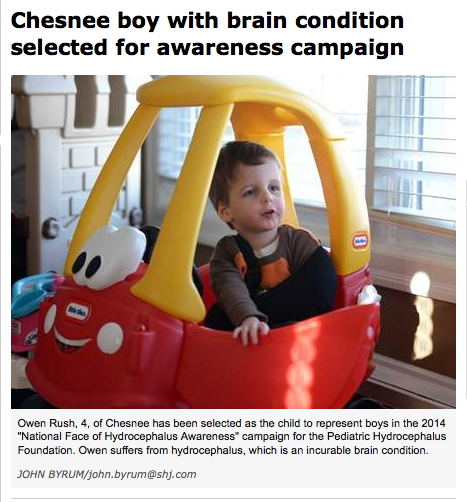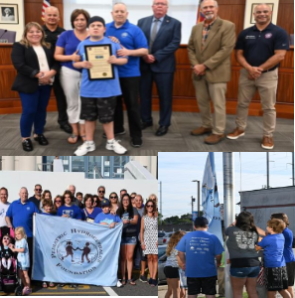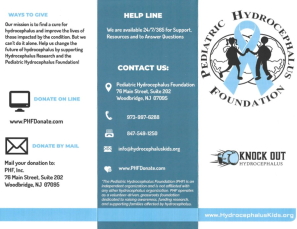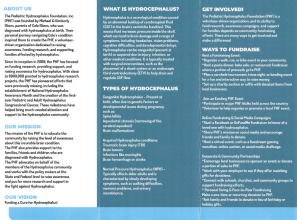PHF In The News: Chesnee boy with brain condition selected for awareness campaign
January 26, 2014 by PHF Filed under Uncategorized

Before his first birthday, Owen Rush had undergone five surgeries for an incurable brain condition.
The 4-year-old Chesnee boy will raise awareness of the condition he’s battled since birth in a national campaign.
Owen will serve as the 2014 “National Face of Hydrocephalus Awareness” for the Pediatric Hydrocephalus Foundation. Owen will represent male children, while a 4-year-old New Jersey child will represent girls.
He will be featured in ad campaigns, promotional materials and literature for National Hydrocephalus Awareness Month in September. He and his family also will travel to Washington, D.C. for “National Hydrocephalus Awareness Day on Capitol Hill” in August.
Hydrocephalus affects hundreds of thousands of Americans of all ages, according to the Hydrocephalus Association. The condition occurs when excess cerebrospinal fluid surrounds the brain and spinal cord. The excess fluid can harm brain tissue and can be fatal. Hydrocephalus occurs at birth or may develop later in life.
Owen’s parents, James and Stacie Rush, learned Owen, their second child, had the condition when Stacie was 20 weeks pregnant.
“We didn’t know anything about hydrocephalus,” James said.
The couple was faced with many unknowns and asked many questions. Why did Owen have it? How did he get it? What would happen after his birth?
Stacie said they were uncertain what potential challenges awaited their son.
Abortion was not an option.
“We just continued with the pregnancy,” Stacie said.
She cried when fears set in. She wondered if she had unknowingly passed on genes that caused Owen’s hydrocephalus. Testing revealed she had not.
Owen — their “miracle” — was born Dec. 17, 2009. After five days in a neonatal intensive care unit, Owen spent a couple of weeks at home before his first shunt was implanted.
The shunt malfunctioned on Mother’s Day 2010, then again on Father’s Day, requiring emergency surgeries. A different shunt was implanted in another area of Owen’s brain later that year. Surgery to repair his skull was performed Thanksgiving.
Fortunately, there have been no more emergency complications with Owen’s shunt. But he began having seizures around 10 months old – as many as 40 a day.
Surgeons implanted a medical device this past August in the hopes to help treat Owen’s epilepsy and improve his quality of life. He continues to have about 15 seizures each day.
“Though we’ve not seen any change in his seizures, he is more cognitively aware,” Stacie said.
Owen cannot tell you if he’s hungry, cold or needs his diaper changed. Yet, he happily runs to give you a hug and announce he loves you. There’s almost always a smile on his face, even when he’s not well.
Owen may cry when nurses draw his blood, then he wants to hug them.
“He’s so loving,” Stacie said.
And at the emergency room, the parents are told that Owen appears fine. James said they explain that’s just the way Owen is—he gets sick and turns around for a hug.
Owen’s grandfather, Charlie Drake, called him a “trooper.”
Stacie said Owen isn’t saddened about his limitations.
“He has no conception of fear,” she said.
“He’s my bionic boy,” she said with a smile as Owen walked through the living room.
Stacie took the photo of Owen that was randomly selected by the Pediatric Hydrocephalus Foundation.
Owen was in the backyard wearing his big brother, Drake’s hat, when she snapped the shot with her cellphone. Owen also has a little sister named Charlee-Kate who looks out for her big brother and warns her parents when he’s having a seizure.
Stacie, a respiratory therapist, works weekends, while James, a deputy with the Spartanburg County Sheriff’s Office, works nights.
A typical day starts with a flurry of activity – assembling book bags and deciding who will take which kids where.
Drake attends Chesnee Elementary School, while Owen is at McCarthy Teszler School.
Owen has about 10 doctors. The family is often rushing to appointments and therapy sessions. When she has spare time, Stacie prepares for the next day.
The couple has learned to take one day at a time and not take small things for granted.
James said they wish hydrocephalus received more funding that would advance treatments.
Owen could die if his shunt malfunctions.
Michael Illions, vice president of the Pediatric Hydrocephalus Foundation (PHF), has a son, Cole, who was the inspiration for the foundation. Illions said in a phone interview that Cole, 8, has had 13 surgeries related to hydrocephalus. Hydrocephalus and the surgeries to treat it have left Cole unable to speak and caused other developmental delays.
“It’s been heartbreaking and difficult,” Illions said.
Cole, he said, excels in math, electronics and reads. He’s able to communicate by typing his thoughts.
Illions said a lack of advancements in treatment has left many affected individuals unable to lead full, productive lives.
Illions said that although someone with hydrocephalus may not appear sick, they have a potentially fatal condition.
He said hydrocephalus has not received the same level of attention as other conditions.
Hydrocephalus is often treated with a shunt system that’s surgically inserted to divert the flow of excess cerebrospinal fluid to another area of the body where it’s absorbed, according to the National Institute of Neurological Disorders and Stroke.
Illions and others want to see a cure.
“While the shunt itself is a life-saving device, it has its own problems,” Illions said.
He said shunts are subject to failure and there’s a window of time to correct that failure.
“It’s like a ticking time bomb when the shunt fails,” he said.
Hydrocephalus affects an estimated one to two of every 1,000 babies born in the United States.
PHF is an all-volunteer nonprofit that provides education and increases awareness of hydrocephalus with 34 state chapters. In addition to providing support to families, the organization also advocates for those with the incurable brain condition and raises funds for research in hopes there will be a cure. According to numbers provided by PHF, it has awarded $225,000 to hospitals, neuroscience institutes and medical research centers for research and education since 2010.
Illions said the face for PHF’s awareness campaign is randomly selected.
The foundation received 160 entries from around the world, including Africa, the United Kingdom, Pakistan, India, Australia and the Philippines. About 40 states also were represented.
Illions expects a “huge turnout” at this year’s annual retreat in Washington, D.C. He said more than 100 people have registered so far.
Owen’s photograph and his story are featured on the foundation’s website at www.hydrocephaluskids.org.
Owen has inspired the Rush family more than they thought imaginable.
“He’s definitely taught us patience and so much,” Stacie said.
James said they have more gratitude for everyday things.
“Simple things for us are accomplishments for him,” James said.
What some consider a big deal, is not so big after all, James said.
Stacie’s mother, Sandra, said God has helped the family through it all.
“There are strengths that you don’t know you’ve got,” Sandra said.
“Exactly — until you’re faced with it,” Stacie added.
 Read more at: https://html.com/attributes/img-width/>
Read more at: https://html.com/attributes/img-width/>



























